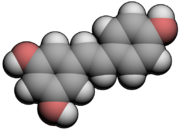Trans-resveratrol
 |
|
 |
|
 Chemical structures of cis- ((Z)-resveratrol, left) and trans-resveratrol ((E)-resveratrol, right)
|
|
| Names | |
|---|---|
| Other names
trans-3,5,4′-Trihydroxystilbene;
3,4′,5-Stilbenetriol; trans-Resveratrol; (E)-5-(p-Hydroxystyryl)resorcinol; (E)-5-(4-hydroxystyryl)benzene-1,3-diol |
|
| Identifiers | |
|
3D model (Jmol)
|
|
| ChEBI | |
| ChemSpider | |
| DrugBank | |
| ECHA InfoCard | 100.121.386 |
| KEGG | |
|
PubChem CID
|
|
| RTECS number | CZ8987000 |
| UNII | |
|
|
|
|
| Properties | |
| C14H12O3 | |
| Molar mass | 228.25 g·mol−1 |
| Appearance | white powder with slight yellow cast |
| Melting point | 261 to 263 °C (502 to 505 °F; 534 to 536 K) |
| Solubility in water | 0.03 g/L |
| Solubility in DMSO | 16 g/L |
| Solubility in ethanol | 50 g/L |
| UV-vis (λmax) | 304nm (trans-resveratrol, in water) 286nm (cis-resveratrol, in water) |
| Hazards | |
| Safety data sheet | Fisher Scientific Sigma Aldrich |
| R-phrases (outdated) | R36 (irritating to eyes) |
| S-phrases (outdated) | S26 (in case of contact with eyes, rinse immediately with plenty of water and seek medical advice) |
| Lethal dose or concentration (LD, LC): | |
|
LD50 (median dose)
|
23.2 µM (5.29 g) |
|
Except where otherwise noted, data are given for materials in their standard state (at 25 °C [77 °F], 100 kPa).
|
|
|
|
|
| Infobox references | |
Resveratrol (3,5,4′-trihydroxy-trans-stilbene) is a stilbenoid, a type of natural phenol, and a phytoalexin produced by several plants in response to injury or, when the plant is under attack by pathogens such as bacteria or fungi. Sources of resveratrol in food include the skin of grapes, blueberries, raspberries, mulberries.
Although it is used as a dietary supplement, to date there is no clear evidence that consuming resveratrol affects life expectancy or human health.
There is no evidence of benefit from resveratrol in those who already have heart disease. A 2014 Chinese meta-analysis found weak evidence that high-dose resveratrol supplementation could reduce systolic blood pressure.
As of 2016[update], there is no evidence of an effect of resveratrol on cancer in humans.
There is no conclusive human evidence for an effect of resveratrol on metabolism.
There is no evidence for an effect of resveratrol on lifespan in humans as of 2011[update].
In 2010, GlaxoSmithKline (GSK) suspended a small clinical trial of SRT501, a proprietary form of resveratrol, due to safety concerns, and terminated the study later that year.
Although limited human studies have shown resveratrol is well-tolerated, one clinical study of Alzheimer's disease patients showed there were side effects from daily intake of up to 2 grams, including nausea, diarrhea, and weight loss.
...
Wikipedia
